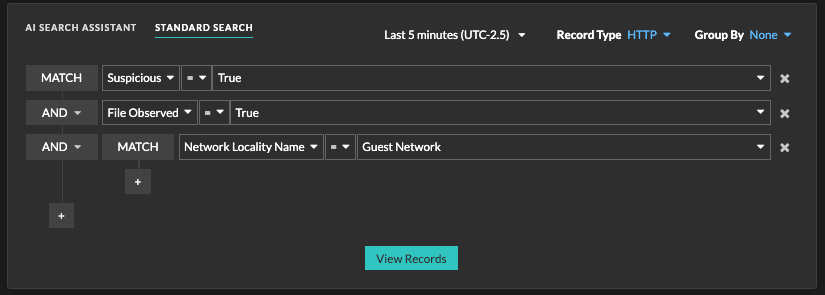Query for stored records
You can query records that are stored in the recordstore with a standard search or with AI Search Assistant.
- Learn more about querying records with a standard search.
- Learn more about querying for records with AI Search Assistant.
- To learn how to query for a specific record, see our walkthrough for Discovering missing web resources.
- You can also automate this task through the REST API.
Next steps
| Note: | To create a record query for a custom metric, you must first define the record relationship by linking the custom metric to a record type. |
Query records with a standard search
The Records page enables you to build a complex filter to search for records.
Here are some important things to know about record queries with standard search:
- You can specify multiple criteria with OR (Match Any), AND (Match All), and NOT operators.
- You can group filters and nest them to four levels within each group.
- You can edit a filter group after you create it to refine search results.
Next steps
- You can view and drill down on record query results.
- You can refine your record query filter.
- You can click the Save icon
 from the top
right of the page to save your filter for another time.
from the top
right of the page to save your filter for another time. - You can click a packet icon next to a record to start a packet query that is filtered by that record or click the query link at the bottom of the table to start a packet query for all displayed records.
Query records with AI Search Assistant
AI Search Assistant enables you to search for records with questions written in natural, everyday language to quickly build complex queries compared to building a standard search query with the same criteria.
For example, if you query for "Were there any suspicious HTTP transactions with files in the last 7 days?'", the following AI Search Assistant query is displayed:
Time Interval = Last 2 days and Record Type = [HTTP] Suspicious = True and File Observed = True
Here are some things to consider when searching for devices with AI Search Assistant:
- Prompts are mapped to the same record filter criteria that you specify when building a standard search.
- Prompts can include absolute and relative time ranges, such as "Show me traffic with Potential SQLi in the last 7 days". The current year is applied if a year is not included for a date.
- Prompts should be as clear and concise as possible and we recommend that you try writing a few variations to maximize your results.
- The ExtraHop system might be unable to process a query that contains requests for record information that is outside of the available filters.
- The ExtraHop system can retain user prompts for product improvement purposes; we recommend that you do not include proprietary or confidential data in your prompts.
- You can edit the query filter criteria to refine search results.
Before you begin
- Your ExtraHop system must be connected to ExtraHop Cloud Services.
- AI Search Assistant must be enabled by your ExtraHop administrator.
Next steps
- You can view and drill down on record query results.
- You can refine your record query filter.
- You can click the Save icon
 from the top
right of the page to save your filter for another time.
from the top
right of the page to save your filter for another time. - You can click a packet icon next to a record to start a packet query that is filtered by that record or click the query link at the bottom of the table to start a packet query for all displayed records.




 to refine your query filter
criteria.
to refine your query filter
criteria.

Thank you for your feedback. Can we contact you to ask follow up questions?